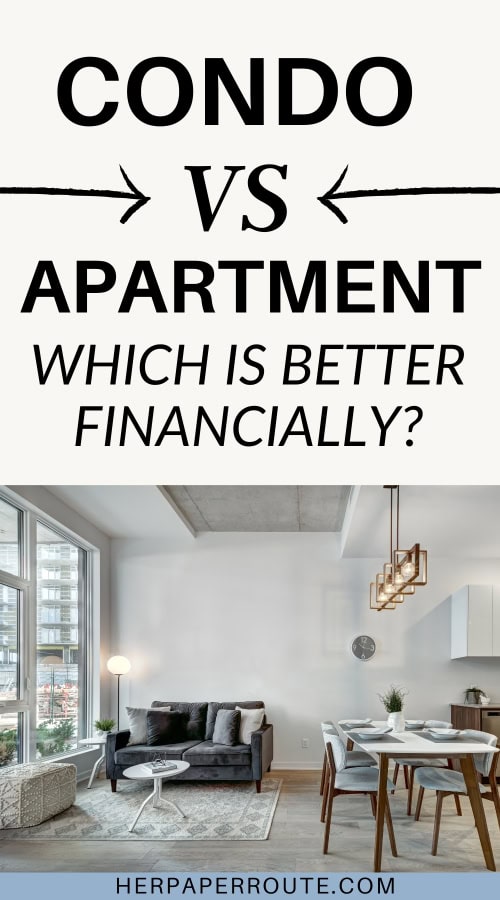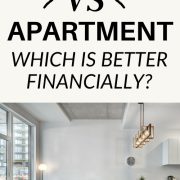Condo Vs Apartment: Which One Makes Better Financial Sense?
Maybe you’re in the market for a place to live, but you aren’t ready to commit to something too large yet. A condo or apartment can be the perfect thing.
But as far as condo vs apartment goes, which one makes better financial sense? What are the things you should be aware of about each one? Find out if a condo or apartment is better for you.
As an affiliate partner of various brands and sponsored content, HerPaperRoute may earn commission on qualifying purchases. Disclaimer | Advertise With Us
What is the Difference Between a Condo vs. Apartment?
The difference is typically in whether you are renting or owning, though there are exceptions to both. Generally, you own a condo, and you rent an apartment.
While a condo may offer more space and the ability to pay off a mortgage, apartments give flexibility and rental opportunities.
What Is a Condo?
A condo is the ownership of an individual unit with shared rights to common areas and amenities. It’s nice because you get access to things like pools, barbecue areas, and other great things, but without having to purchase them yourself.
If you want to own your residence, this can be a great way to get started with it. Condos are often modern, have more space than an apartment, and give you the added benefit of owning something.
What Is an Apartment Really?
An apartment is an individual unit located within a larger building or complex. Apartments are usually rented, though, on some occasions, they can be purchased in places like New York.
Apartments are great when you aren’t sure how long you’ll be living somewhere or you want to see what the neighborhood is like before committing to buying. They also offer amenities like pools and gyms.
Are condos made better than apartments?
This is an interesting question: are condos built better than apartments? Are they higher quality?
Often, condos are nicer on the inside than apartments are. They may offer a bit more of a comfortable lifestyle with more amenities than an apartment.
Another big difference is that you own a condo, so you can’t be forced to move. Unlike apartments, which you rent.
What are the disadvantages of buying a condo?
It’s not all positives with buying a condo, though. What are the disadvantages?
First of all, fees are often expensive with a condo. The property may be kept up well, but you pay quite a bit for that.
There are also taxes to consider. In addition, you’ll have property ownership responsibilities.
Everyone in the condo is responsible for covering the maintenance and repair costs of the building. So if your condo needs a new roof, the cost will be divided among the condos.
Should I Live in a Condo or Apartment?
This is a big question with a lot of different factors to consider. Ask yourself some questions to begin.
First of all, are you thinking of moving soon? If you are planning to move to a new location soon, then buying is probably not your best move.
If you plan on moving anywhere sometime in the next few years, then you should consider renting an apartment instead.
Next, owning property is kind of a big deal. Do you want the responsibility for this?
There are monthly costs, upkeep of the property, and other factors to consider. If you feel that you’re ready for this, a condo could be a good option.
However, if you would rather not have maintenance and home cost responsibilities, an apartment may be a better option.
Last, if you do decide that a condo is the right move for you, are condos available in your location of choice? Do the condos in the area offer the amenities and layout that you want?
Consider these things first, and make sure you are buying a condo because you really want that particular one, not just because you want to buy something.
Does it make financial sense to buy a condo?
There are other things you should also consider, like whether or not buying a condo makes financial sense. Here are the things you should be aware of.
First, you’ll need to qualify for a mortgage to purchase a condo. If this is what you’ve decided, you should first know whether or not qualifying for a mortgage is likely for you.
Take a look at your income, and at the price of the condo you want to purchase, as well as your credit score, and other factors that will help you determine if a mortgage is possible. Consider getting pre-approved in order to show that you’re serious about purchasing and make getting a mortgage more likely.
Next, you should know that condos are many times more affordable than other types of housing. Rather than looking at a traditional home, a condo offers you better prices while still giving you the opportunity of home ownership.
You can also build equity in your condo, meaning you can eventually own the condo outright or sell it for a profit. This can be a very lucrative financial option and can work especially well if this is your first mortgage.
A condo allows you to dip your toe into the homeownership market without taking on an extremely large mortgage that could be too much for you currently.
In addition, you can make rental income if you decide to move away and rent out your condo to someone else. Owning the property gives you the option to become a landlord and make more money.
This can be really helpful for your financial goals if you want to both own a home and make passive income in the future. Keep in mind that some condos may not allow you to rent out your unit and require owner occupation so make sure you check that before purchasing.
Last, you should take the time to consider whether or not you can afford the fees for a condo. These fees can be high, and it’s important to factor them into your choice. Remember, if the mortgage is reasonable but will be taken over with high HOA fees, then it might not be a good deal.
You should be able to see the condo HOA’s financial statements before purchasing in order to see if it’s run well. If the condo association isn’t fiscally responsible, then your fees could go quite high.
Does it Make Sense Financially to Rent an Apartment?
There are also situations where you would need to consider renting instead of buying. And that is perfectly fine to do and can sometimes be a better decision depending on your circumstances.
Here are some reasons why choosing an apartment might make more sense.
First, if you are not in a position to take on a mortgage, then you should consider renting an apartment unit instead of buying a condo. If your credit score or finances still need some work, that’s okay, and you can rent an apartment while you improve your score and save up a down payment.
Next, if you don’t like the idea of HOA fees then you may want to rent. Since many condos have HOA fees or a condominium association, this can eat away at your savings and give you higher expenses.
If you are unsure about paying these high prices, renting an apartment and later looking into purchasing a traditional home may be a better option for you.
Last, if you are unsure about the neighborhood or location you live in, you might want to rent an apartment before you consider buying a condo. If you want to see if you like the location before committing to a long-term situation, it’s a very good idea to rent an apartment first.
If you like the neighborhood, then you can later look at buying a condo. You can decide on the perfect location and buy with confidence because you’ve experienced living in this place.
However, if you don’t enjoy living in that particular location, you can decide to rent or buy somewhere else with no harm done.
When does it make more sense to buy a single-family home?
There’s been a lot of talk about condos and apartments, but there’s another option that we’ve overlooked – the single-family home.
You may feel that this is the most responsible and serious of purchases due to the cost, size of the home, and commitment. But here’s how to figure out if you should bypass apartments and condos and go for a house instead.
You have saved a significant down payment
Single-family home mortgages are likely to be more expensive than what you’d pay for a condo. Due to this, your down payment will need to be larger.
If you’ve been saving up for several years and you feel that you’ve saved up a significant amount (somewhere between 10-20% of the cost of the home), then you may be financially ready to buy a single-family home.
You like the location
Buying this type of long-term property can be a good investment if you are already familiar with the location and you like the area. If you know that the neighborhood is safe and you would like to live there, it’s much easier to consider a large purchase like this.
You plan to stay for several years
It’s a good idea to consider a single-family home if you plan to stay in the area for several years. This type of purchase will give you the space you need to be comfortable for a longer amount of time.
If you plan on staying at the same place for several years, it could be a good time to buy. However, if you are unsure about how long you’ll live in that location, it might not be the best time for this sort of buy.
For example, if you plan on relocating to be closer to family or go to school, or if you are just not quite sure about how much you like the neighborhood, then you should wait instead of buying. You might want to think about an apartment rental instead in this case.
You have the time to look after a single-family home – including yard and other maintenance
Everyone has responsibilities, but if you are so busy that you’re hardly ever home, a condo or an apartment might be more your speed. However, if you have the time to devote to taking care of a large yard, then you might consider a single-family home.
Yards take a lot of work, but if you plan to be outside a lot and don’t mind the commitment, a house could be a good option for you.
The commitment doesn’t feel like too much
Above all, trust your gut. If you feel like the commitment of a single-family home is just too much right now, that’s okay. Go with that! You might want to consider a smaller purchase, such as a condo, or rent an apartment.
But if the commitment feels like something that you could definitely handle, and you have the money and time to devote to it, a single-family home may fit your needs better than the other options.
You might also consider renting a single-family home for a short time to decide if this is the right option for you. You can get used to home maintenance, having a yard, and extra space. Then you’ll be able to decide what the best course of action is.
It will depend on your goals and circumstances whether a condo or apartment makes better financial sense for you.
Deciding between an apartment and a condo can be challenging. While, at first, they can appear similar, they actually have a lot of differences.
For example, a condo is often bought while an apartment is rented. And while they both have amenities that you can use in your daily life, a condo is usually a more upscale option, and it also includes the pride of homeownership.
On the other hand, apartments are excellent for people that are new to the area, don’t have the money for a down payment, are working on their credit scores, or just don’t like the thought of taking care of a property.
When you buy, you’re responsible for the maintenance of your home, though there may be some common areas that you don’t have to handle maintenance for.
So now you know the pros and the cons of apartments and condos. Which will you decide?
There isn’t a right or wrong solution; rather, it comes down to what’s better for you as an individual or for you and your family. Take into account your finances, lifestyle, and the level of commitment you want to have to the property.
Deciding on a condo or an apartment is an important choice, but you can do it!
Related Articles:
- Tips for Saving for a Home While Renting
- 7 Glaring Signs You Bought the Wrong House
- How to Save Money for a House [Ultimate Guide]

Follow along on Instagram!






